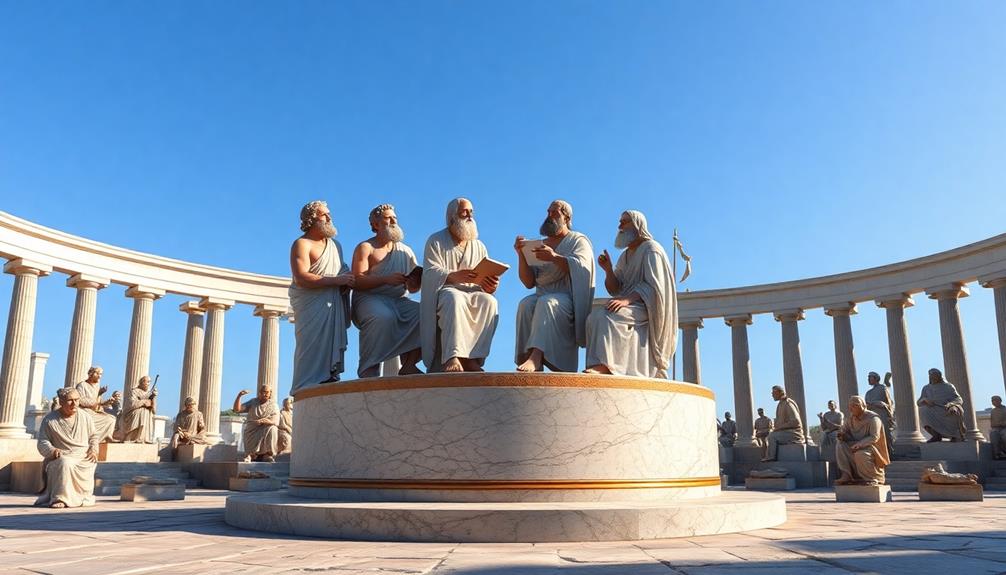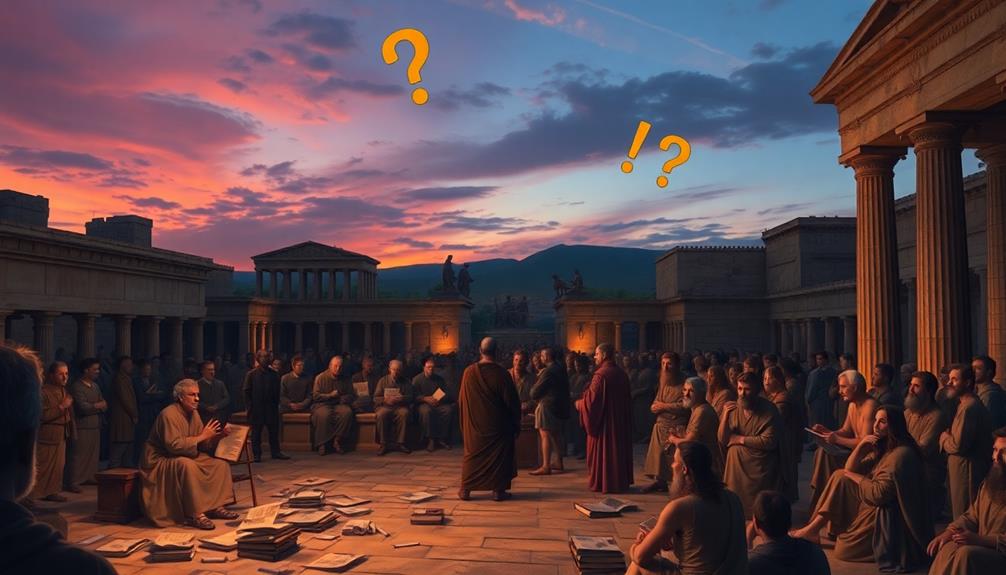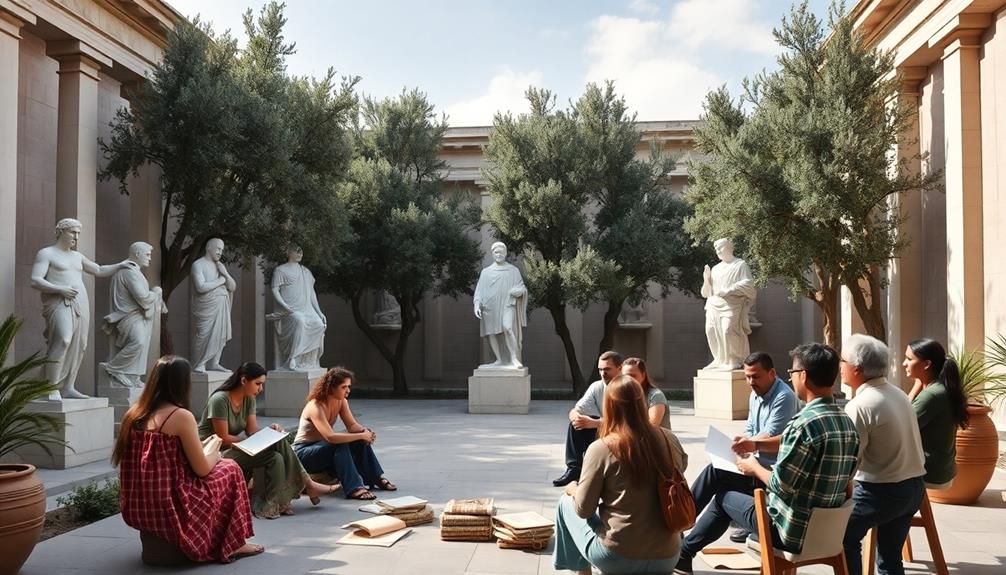Ancient Greek skeptics, like Pyrrho and Carneades, laid bare some bizarre arguments that'll twist your thinking. They questioned the reliability of sense perception, arguing that what you see and feel might be misleading. Pyrrho suggested you should suspend judgment to navigate conflicting impressions, while Carneades emphasized making decisions based on plausible but not guaranteed truths. Their ideas challenge the very essence of certainty, pushing you to question everything you hold to be true. You'll find their curious musings on moral judgments and the nature of existence fascinating, and there's so much more intriguing insight to uncover!
Key Takeaways
- Pyrrho argued that since perceptions are subjective, one should suspend judgment entirely, leading to a life free from dogmatic beliefs.
- Carneades introduced the idea of 'to pithanon,' suggesting that while impressions may be convincing, they do not guarantee truth, complicating decision-making.
- Arcesilaus challenged the idea of absolute truth, advocating that one should remain uncertain about all propositions, fostering an attitude of inquiry.
- The 'bent stick' illusion exemplifies how sensory perceptions can mislead, highlighting the absurdity of trusting appearances without skepticism.
- Ancient skeptics posited that moral judgments are inherently subjective, emphasizing the importance of context and personal experience in ethical decision-making.
The Nature of Skepticism
Skepticism, at its core, invites you to question everything around you, promoting a mindset of inquiry over blind acceptance. Ancient skepticism, rooted in the Greek term "skepsis," urges you to investigate beliefs rather than accept them without evidence. This approach emphasizes the suspension of judgment, or epoch, especially when faced with conflicting impressions.
Key figures like Pyrrho and Arcesilaus challenge your notions of knowledge, arguing that certainty is elusive and that all claims are subject to doubt. In a world increasingly influenced by technology and automation, such as the rise of advanced technology in automation, skepticism encourages you to critically evaluate the impact of these changes on your beliefs and understanding.
You'll find two main branches of skepticism: Academic and Pyrrhonian. Academic skepticism, emerging from Plato's Academy, recognizes your epistemic limitations and rejects dogmatic beliefs. In contrast, Pyrrhonian skepticism advocates for complete suspension of judgment, leaving you to navigate the complexities of appearances and subjective experiences.
Skeptics contend that what you assert as knowledge often stems from personal perspectives, leading to the conclusion that true knowledge might be unattainable.
Ultimately, the nature of skepticism promotes critical thinking and open-mindedness, encouraging you to explore the depths of inquiry and question the very foundations of your beliefs.
Paradoxes of Perception

The exploration of knowledge leads you to confront the paradoxes of perception, where the reliability of your senses comes into question. Ancient Greek skeptics, like Pyrrho and Sextus Empiricus, emphasized that sensory perceptions can often deceive you, suggesting that appearances can't be trusted as indicators of truth. They highlighted the discrepancies in perception among different observers, arguing that no single viewpoint can claim absolute validity.
Curiously, just as coffee's benefits may be perceived differently based on individual experiences, the notion of subjective truth becomes even more complex fresh insights on coffee.
Consider the 'bent stick' illusion, which illustrates how light refraction alters your perception, prompting skepticism about the reliability of sensory experiences. Carneades introduced the concept of 'to pithanon,' acknowledging that although impressions might feel convincing, they don't guarantee knowledge or truth. This complicates the relationship between perception and what you deem real.
Furthermore, optical illusions reveal the limitations of human cognition, demonstrating that what you perceive may not align with reality. Skeptics encourage you to suspend judgment regarding sensory information, urging a deeper inquiry into the nature of truth.
Arguments Against Certainty
When you consider the arguments against certainty proposed by ancient Greek skeptics, you'll find a fascinating exploration of our epistemic limitations.
They highlight how unreliable sense perception and conflicting impressions can cloud your judgment, making it hard to claim any knowledge with certainty.
This resonates with the principles of minimalism for personal growth, which emphasizes self-awareness and intentional living.
Instead of seeking absolute truth, these thinkers suggest focusing on practical living guided by plausible beliefs.
Epistemic Limitations Explored
Several ancient Greek skeptics raised profound questions about the limits of human knowledge, arguing that certainty is ultimately elusive. They emphasized epistemic limitations, suggesting that our understanding is constrained by the subjective nature of perceptions and often conflicting impressions. Acknowledging these limitations can also be akin to processing emotional loss during separations, where embracing uncertainty allows for personal growth and reflection.
Here are three key points to evaluate:
- Pyrrho of Elis advocated for the suspension of judgment (epoché), asserting that differing perspectives on the same phenomenon prevent any claim to absolute truth.
- Arcesilaus, a pivotal figure in academic skepticism, challenged the Stoic belief in reliable knowledge through kataleptic impressions, urging us to maintain uncertainty about all propositions.
- Carneades introduced "to pithanon," which suggests that while we can't achieve true knowledge, we can rely on convincing impressions to guide our actions without asserting certainty.
The existence of widespread disagreement on fundamental issues like ethics and metaphysics only highlights these epistemic limitations.
Ancient skeptics advocated for critical inquiry as a means to navigate these uncertainties, reminding us that doubt is an essential part of the pursuit of knowledge. Embracing this skepticism can lead you to a more nuanced understanding of reality, much like the acceptance needed during emotional healing after a separation, where healing power of words can aid in the process.
Reliability of Sense Perception
Skepticism about the reliability of sense perception fundamentally challenges our assumptions about reality. Ancient Greek skeptics like Carneades and Pyrrho highlighted that our sensory experiences can often mislead us, which raises doubts about the certainty of our beliefs. When you consider that perceptions can vary widely from person to person and situation to situation, it becomes evident that no single perception can be universally trusted.
| Skeptic | Argument | Outcome |
|---|---|---|
| Carneades | Sense perceptions are often misleading. | Leads to false beliefs about reality. |
| Pyrrho | Perceptions vary among individuals. | No single perception deemed reliable. |
| Arcesilaus | Questions Stoic kataleptic impressions. | Certainty is unattainable. |
| Sextus Empiricus | Conflicting impressions (e.g., bent stick in water). | Illustrates limitations of sensory experiences. |
| General View | Advocates for suspension of judgment (epoché). | Rational to withhold assent to sensory evidence. |
These arguments underline the skepticism surrounding sense perception, suggesting that it's rational to suspend judgment. Without certainty, you may find it wise to approach beliefs formed solely on sensory experiences with caution, recognizing the inherent limitations in determining truth.
Conflicting Impressions and Judgment
The ancient skeptics' perspective on conflicting impressions offers a compelling argument against certainty in knowledge. They emphasized the need for suspension of judgment, or epoché, when faced with contradictory evidence. This approach challenges the reliability of knowledge claims, suggesting that certainty is an illusion.
Understanding the concept of financial health can similarly highlight the importance of evaluating various perspectives before making decisions in personal finance.
Here are three key points that illustrate their views:
- Relativity of Impressions: Pyrrho of Elis argued that different perspectives lead to various interpretations, revealing the subjective nature of our experiences. Accepting this relativity can foster a more peaceful existence.
- Carneades' Criterion of Truth: Carneades proposed "to pithanon," which suggests that we should rely on convincing impressions for practical decision-making, rather than seeking absolute truths that may not exist.
- Skeptical Challenges by Arcesilaus: Arcesilaus questioned the reliability of sense perceptions, asserting that all assertions are open to doubt. This skepticism compels us to examine our beliefs critically.
Ultimately, these ancient thinkers remind us that conflicting impressions warrant a careful and thoughtful approach to knowledge, urging us to recognize the limits of certainty and embrace a more nuanced understanding of truth.
The Role of Appearance

While it might seem intuitive to trust your senses, ancient Greek skeptics argued that appearances can be deceptive and often lead us astray. Pyrrho of Elis suggested that because sensory perceptions can differ greatly among individuals, it's wise to suspend judgment about the truth of those appearances. This approach fosters tranquility by avoiding the turmoil of conflicting beliefs.
In a similar vein, adopting a mindset of positivity can enhance mental well-being and resilience, supporting your personal growth as emphasized in practical strategies for transformation. Sextus Empiricus further emphasized that all beliefs stem from appearances, and without a reliable criterion for truth, you can't favor one appearance over another.
Instead of seeking absolute truths, ancient skeptics advocated for a life guided by practical considerations. Carneades introduced the idea of "to pithanon," which refers to plausible impressions that can inform your actions. While these impressions may not reveal ultimate truths, they still hold significance in daily decision-making.
This skepticism surrounding appearances encourages a mindset of inquiry and open-mindedness. By recognizing that sensory perceptions often mislead, you can navigate the complexities of life with a more discerning eye.
Ultimately, the ancient skeptics remind you to question the reliability of appearances and to seek deeper understanding beyond the surface.
Ethical Implications of Skepticism

Recognizing the limitations of appearances naturally leads to questioning how we make ethical decisions. Ancient skeptics, like Carneades and Arcesilaus, proposed that moral judgments rely more on plausible impressions than on absolute knowledge. This perspective encourages a suspension of judgment, suggesting that definitive ethical standards may be unattainable.
Understanding the complexities of human behavior, such as those found in narcissistic relationships, can further illustrate how subjective experiences influence our moral choices. Here are three key implications of this skepticism:
- Moral Relativism: Ethical decisions become subjective and context-dependent, allowing for varying moral standards based on circumstances rather than fixed truths.
- Flexible Perspective: By critiquing Stoic ethics, skeptics promote an open-minded approach that challenges rigid moral frameworks, fostering adaptability in ethical reasoning.
- Pragmatic Approach: Although skepticism may lead to cognitive paralysis, it encourages individuals to act based on the most convincing appearances, facilitating practical decision-making.
This flexible perspective can help you navigate complex moral landscapes, acknowledging that certainty in ethics is elusive. In this light, skepticism doesn't paralyze action but instead empowers you to make informed ethical decisions, considering the nuances of each situation while remaining open to diverse viewpoints.
Legacy of Ancient Skeptics

Ancient skeptics like Pyrrho, Arcesilaus, and Carneades left a lasting impact on philosophy, shaping how we think about knowledge and belief. Their legacy centers on the idea that knowledge isn't always attainable, advocating for the suspension of judgment. This approach encourages you to recognize your limitations, fostering a more open-minded perspective.
In a similar vein, cultivating cultural intelligence can enhance your ability to navigate diverse viewpoints, reflecting the skeptics' emphasis on understanding the complexities of knowledge.
Pyrrhonism teaches that by avoiding dogmatic beliefs, you can cultivate a peaceful, contented life. This concept has influenced modern practices, like mindfulness, which emphasize living in the moment without rigid attachments.
Arcesilaus transformed Plato's Academy, integrating skepticism into its foundation. He argued against the possibility of certain knowledge, promoting balanced debates that question established truths.
Carneades took skepticism further, introducing the practical criterion "to pithanon," which suggests that convincing impressions can guide your actions, even when certainty is elusive. This focus on subjective impressions underscores the importance of personal experience in shaping beliefs.
The methodologies and principles established by these ancient skeptics continue to resonate in modern epistemology, encouraging you to critically examine knowledge claims and appreciate the nuances of differing perspectives. Their insights remind us that our understanding is often more complex than it seems.
Frequently Asked Questions
What Did Ancient Skeptics Believe?
Ancient skeptics believed certainty in knowledge's unattainable, urging you to suspend judgment on all beliefs. They emphasized inquiry over fixed opinions, valuing conflicting impressions and experiences to guide your actions instead of absolute truths.
What Are the Main Arguments of Skepticism?
You'll find that skepticism argues knowledge is elusive, urging you to question everything. By weighing conflicting views and recognizing subjective experiences, it challenges you to withhold judgment and embrace the uncertainty inherent in belief systems.
Who Was the Most Controversial Greek Philosopher?
When you think about controversial Greek philosophers, Carneades stands out. His challenge to Stoic knowledge claims stirred significant debate, forcing everyone to reconsider the nature of certainty and the reliability of human impressions in understanding reality.
What Is the Skeptic's Argument From Gorgias?
Gorgias argues that nothing exists, and if it did, you couldn't know it. Even if you could know it, you couldn't communicate it. This challenges your understanding of reality, knowledge, and meaningful discourse.
Conclusion
In exploring ancient Greek skepticism, you've journeyed through a labyrinth of thought. These philosophers didn't just throw shade on certainty; they encouraged a healthy dose of doubt. By questioning perceptions and appearances, they nudged us to recognize that not everything is as it seems. Their legacy isn't just about skepticism; it's about nurturing a mindset that embraces inquiry over blind belief. So, the next time you encounter a firm opinion, remember the gentle art of questioning that these ancient thinkers championed.









